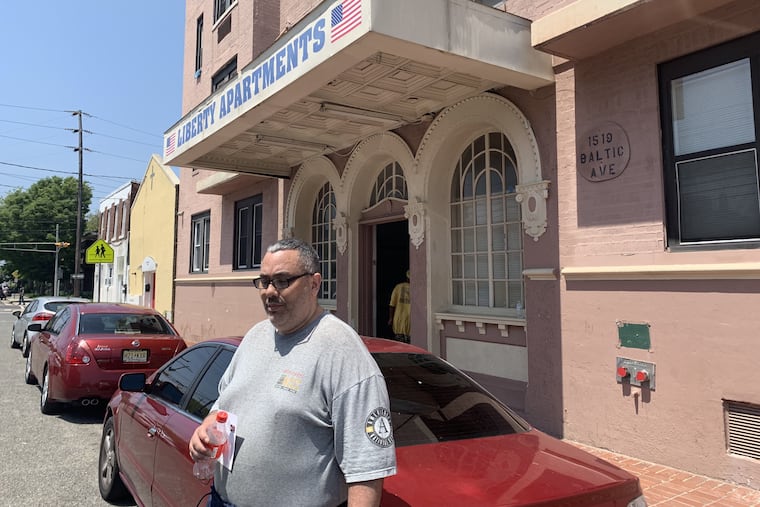Atlantic City: Historic affordable housing buildings will be fixed up, but not gentrified
Three historic Atlantic City buildings that have become rundown affordable housing will be totally rehabbed under a purchase agreement by WinnDevelopment, officials announced. They will remain affordable housing.

ATLANTIC CITY — One building was the old Liberty Hotel, built on Baltic Avenue in 1924 and listed in a 1950s “Green Book” of places welcoming to black travelers, one of 27 in Atlantic City.
Another was the old Illinois Avenue School, built in 1906.
The third was once the celebrated Northside YMCA on Arctic Avenue, built in 1927, a community gathering place that knit together the city’s historically thriving black neighborhood.
All three buildings later became affordable housing and, more recently, severely rundown properties described Wednesday by Mayor Frank Gilliam as “dismal, deplorable, subpar.”
“Living in squalor is not something any municipality should have to deal with,” Gilliam said.
But local and state officials announced Wednesday that WinnDevelopment would acquire all three properties as part of an opportunity zone investment, substantially rehabilitating the properties, and keeping them affordable housing for the required 30 years and, vice president Brett Meringoff said, beyond.
“It’s about time!” shouted a man who stuck his head out of a third-story window at Liberty, 1519 Baltic Ave., when asked about the plans.
Gentrification, a mixed blessing in places like Jersey City and Hoboken, would not be the definition of success in Atlantic City, said Lt. Gov. Sheila Oliver, who has authority over city government under a state takeover and attended the announcement.
“We’re not going to worry about gentrification in Atlantic City, because we are doing this right,” Oliver said. “We are building up the Atlantic City community from the ground up. We are not subscribing to a top-down policy of development in Atlantic City.
“We are all concerned about the generations of families who have lived here, or even workers in the city who want to live here,” she said.
She said supporting the community in Atlantic City has been neglected since casino gambling was legalized in 1976. “For too long and for too many decades, the people’s voice has not been heard in terms of the community the residents would like to see.”
Given the city’s small population (39,000), Oliver said, she believes that affordable housing could be upgraded for people already living here, nearly 40 percent of them in poverty. Earlier this month, the city’s Housing Authority announced it would redevelop two public housing developments in Atlantic City, the 82-year-old Stanley Holmes Village and the 66-year-old Buzby Villages.
“This is a very doable thing,” she said. “Atlantic City does not have 200,000 residents. ... We can do a lot to improve the quality of life for people.”
In all, 153 units of income-restricted family affordable housing scattered among the three properties will be upgraded through a variety of funding, including developer loans, private investment, and state and local resources. The company said it will negotiate a payment in lieu of taxes.
The purchase price was $17.3 million, the company said. Meringoff said the company expected its tax-exempt bonds to be approved this week by the New Jersey Housing Mortgage Finance Agency. In addition, the company has commitments from CitiBank, with more than $20 million. He said he expected work to begin late summer or early fall.
Asked by Sal DaSilva, a resident of Liberty Apartments, about rent increases, he said the rent would continue to be calculated as 30 percent of a resident’s income, in keeping with federal guidelines.
And he assured another resident, Christina Diaz, 33, who attended the news conference at St. Augustine Episcopal Church, that maintenance and property management would improve under Winn’s ownership.
Diaz said the building was suffering from neglect, and apartments were moldy and long overdue for new appliances and general repairs. She said the previous owners were not responsive to complaints and requests for improvements.
“The apartment buildings, yes, they are in bad shape,” she said. “They could attend to the tenants more. Don’t sweep us under the rug. Overall, they have a lot of things to do.”
City Councilman Kaleem Shabazz said the city could strike a balance between encouraging new residents and development that might bring in second-home owners and young professionals while also shoring up housing for the city’s longtime residents. He cited the success of new market-rate, amenity-filled rental housing that has opened at 600 Atlantic Ave., known as 600Nobe.
“We can do both,” he said.
WinnDevelopment is part of WinnCompanies, which owns more than 100 multifamily housing properties in 11 states and Washington, D.C., totaling more than 13,000 apartments, according to its release.
WinnCompanies spokesperson Ed Cafasso said the company did not expect residents to be displaced during the rehabilitation, but said they might be asked to leave their units for a day or so for other units in the building in what is known as an “occupied rehabilitation.”
WinnCompanies’ local counsel is Tim Cunningham, former head of the state’s Division of Local Services, who was previously appointed to directly oversee Atlantic City under the state takeover. He is now in private practice.